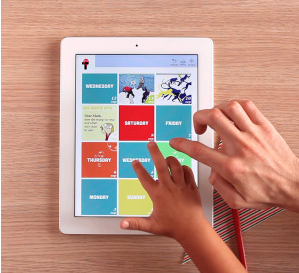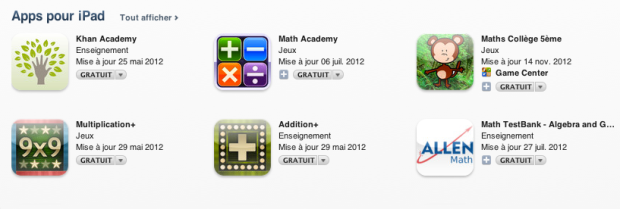I don’t have an iPad nor children, for the moment. However during my random train path, in a queue or watching popular videos (lolcats, babies, puppies), I couldn’t miss the fact that many mini-humans already owned an iPad and were very comfortable with it. It seems natural in their small skilful hands, like they have been using them forever: scrolling, zooming, switching applications and so on.
This scene seems more and more natural for me but,
- What implications does it have on the education of the kids at school and at home?
- How does this technological tool reshape education?
- What are the advantages and the downsides of “Professor iPad”?
This is a vast controversy subject and still currently debated. Blogs articles unleash parent’s passions, which are always very reactive when it comes to their heirs. My purpose is not to defend the iPad invasion in the classrooms or to cry wolf but to give an overview of the possibility of an interaction between traditional education and a virtual one.
Mummy, can I have iPad for breakfast please ?
Amazing isn’t it? These kinds of video are blooming on the net for the delight of our zygomatics. What to think of the intrusion of the iPads in our home? A New York Times blogger, David Pogue, has already asked himself: iPad or not ipad that is the question? In his article “A parent struggle with a child’s iPad addiction” the journalist questions his son’s addiction (in his definition of an addiction) for his iPad. After analyzing the benefits and the dangers of the interaction between his son and his tablet, Pogue concluded as follow:
For now, I’m trying to live by the mantra, “Moderation in all things.” As long as iPad use is part of a balanced diet of more physical play and non-electronic activities, I think my little guy will probably be O.K.
The article gave rise to no less than 947 comments…
Following the impact of the post, David Pogue got interviewed on that subject:
So, a key seems to be parental mediation between the kids and the tablet, which is also recommended for television, video games, telephony, internet access and so on.
The pedopsychiatrist Pierre Delion explains, in an interview, that the traditional games shouldn’t be replaced by screens. However, he doesn’t deny the importance of digital tools in our daily routine. He argues in favor of a support of the parents in the children’s discovery of the virtual games so they could understand the relationship between the real and the virtual. Children with communication problems or anxiety could also find a more comfortable relation in the virtual games than in the traditional ones. Professor Delion reminds us that :
Un enfant ne s’éduque jamais tout seul et l’iPad à mon sens ne doit pas être laissé aux enfants avant 9 ans. N’oublions pas que cette tablette reste un portail vers Internet.
The solution would be found in a balance in the private educational environment. The educational games participate in the development and in the creativity of the children. However, time spent with the iPad has to be clearly limited and controlled by the parents. So the relation between the children and the tablet does not fall into an addiction. In addition, Pierre Delion underlines the fact that the interactive games do not improve young children intelligence.
Daddy, can I take my iPad at school?
According to Apple, the iPad seems to be the revolution that the education was waiting since Plato’s Academy, revealed by this official video:
iPad is showing up in peoples’ lives all around the world. Now, when we set out to create the iPad, we set out to create not just a new product, but a new category. Tim Cook
It is obvious that this video shows a 100% positive record of the arrival of theirs tablets in the classrooms. It is shown that the iPad can be used from the maternity to the university. Everything is a matter of application(s). At each age its applications. But what evidence is there of this? Some studies have already addressed the issue.
One of the main studies was carried for Houghton Mifflin Harcourt, a textbook publisher. The aim was to compare the performance of two groups of children at the Amelia Earhart Middle School in Riverside, California. A control group used the traditional Holt McDougal Algebra 1 textbook, while an experimental group used iPads with an interactive version of the same coursework. According to The Economist, at the end of the year: 78% of pupils using the interactive text scored “proficient” or “advanced” on the California algebra test, compared with only 59% scoring likewise with the standard textbook.
Students’ interaction with the device was more personal. You could tell students were more engaged. Using the iPad was more normal, more understandable for them. Coleman Kells, principal of Amelia Earhart Middle School.
Moving textbooks to mobile devices will reinvent learning. Marita Scarfi, CEO of digital-focused marketing agency Organic.
However, the major downside has been enlightened: the cost. The Apple iPads are still a $500-plus investment per unit. Funding is still a problem, particularly for public schools, explains Christina Bonnington for Wired. She says that one of the solutions would be sites like DonorsChoose.org which can provide funds for schools. Anyway, the cost shouldn’t stop us from thinking education in that way.

Source: book cover, Tony Wagner, Creating Innovators: The Making of Young People Who Will Change The World.
The first iPad summit this year supported that of point of view. As a young student present at the summit reported: participants gave all their attention to a single piece of technology and how it might be applied in the realm of education. Tony Wagner, Ph.D. Harvard professor, highlighted the themes of the conference:
We must change the framework of education to reflect what our students need in the world today. Tools like the iPad allow educators and students to be creative, flexible, and innovative in ways never before seen. The same-old-same-old approach in education has only been driving the failure of the American educational system. If we want different results, we need to do something different.
Three main conclusions emerged from this First iPad Summit:
- iPad is simply a tool and not the magical, miracle object that will innovate education by itself
- iPad in the classroom must be linked with professional development
- iPad in education must be more than a replacement program
Bye bye Candy shop, Hello Apple store!
What are the educative applications? There is a certain numbers of applications destined to teach, develop, train, create and so on. Most of these apps have a recreational side which can transform the learning process into a less painful and boring experience for the children. From the most rudimentary to the serious Khan Academy, the Apple store proposes numerous applications for all ages, free as well as charged. Most of these apps work on the logic of a serious game: software that combines a serious intention, like pedagogical, informational, communicational, marketing, ideological or drive with fun. The vocation of a serious game is to make the serious side attractive with an interaction, rules or possibly with play goal.¹
Switch off your iPad, it’s time to go to bed now !
To conclude, the iPad isn’t a magical solution nor will it replace the contribution of a teacher. However, E-learning may allow developing certain abilities in children who are in an environment where the virtual is increasingly present. It’s central that children learn how to use the tools that they will find later in their studies or in their daily life/routine. Like David Pogue reminds us, the secret is in moderation. The iPad summits will certainly improve the knowledge, in a collaborative aim, of the utility and danger of this esthetic tool. The cost can clearly be a barrier to the spread of that product. We shouldn’t forget that education is profitable new market as well as a good way to attract future customers.
Even if there is still a lot to do and to develop around the perspective of e-teaching, I wish all the best for the collaboration between the teacher and the “Professor iPad”.
Education needs you !
read more: http://www.ipadpd.com/blog.html
1: Wikipedia, http://fr.wikipedia.org/wiki/Jeu_sérieux




#1 by Glenda on April 8, 2013 - 15:03
Hi, after reading this remarkable post i am as well cheerful to share my experience here with colleagues.
#2 by www.camsex4u.net on April 14, 2013 - 02:21
Very good information. Lucky me I ran across your site by chance (stumbleupon).
I have bookmarked it for later!
#3 by greenhousemiami.com on April 16, 2013 - 20:13
Thanks for your marvelous posting! I quite enjoyed reading it, you can be a great author.
I will make sure to bookmark your blog and will often come back later in life.
I want to encourage you continue your great work, have a nice holiday weekend!
#4 by cumdrinkings.com on April 18, 2013 - 08:55
Howdy I am so glad I found your website, I really found you
by error, while I was researching on Bing for something else,
Regardless I am here now and would just like to say
cheers for a remarkable post and a all round enjoyable blog (I also love the theme/design), I don’t have time to browse it all at the minute but I have bookmarked it and also added your RSS feeds, so when I have time I will be back to read much more, Please do keep up the excellent work.
#5 by Carla on August 24, 2013 - 06:14
I’ve read some good stuff here. Definitely worth bookmarking for revisiting. I wonder how much attempt you put to create this type of great informative site.
#6 by thanksgiving on September 15, 2013 - 01:59
I am sure this paragraph has touched all the internet visitors, its really really nice article on buildinhg up new blog.